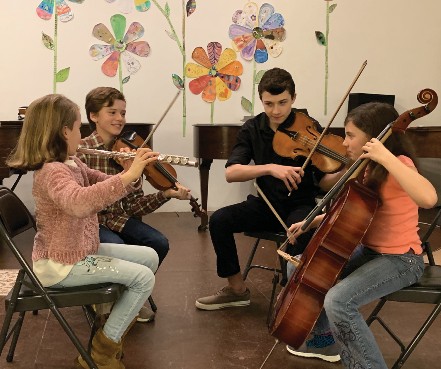Music is a universal language, and one that brings us together. It speaks to us on an emotional level, intellectually at times, and often transports us to a special place through the melody and sound.
Music education feeds into a similar philosophy, by sparking joy in the lives of children while also building confidence and important skills through lessons, practice, and performance.
Three leaders in music education in Rochester–executive director of the Kanack School of Musical Artistry Alice Kay Kanack, associate dean and Director of Eastman Community Music School Petar Kodzas, and president and executive director of the Hochstein School Peggy Quackenbush—are all committed to ensuring opportunities for young people through music education with their organizations.
“Providing children with opportunities to experience music should be seen by parents on equal footing as providing healthy nutrition or physical activity,” Kodzas says. “Music moves us and creates a more beautiful, compassionate person.”
There are many benefits to music education, as it provides students with a high-level of discipline and enhances skills to creatively collaborate with others.
“There’s the ability to communicate confidently,” Kanack says.
“To be a musician is to be able to stand and perform in front of a crowd, and [to] have them respond emotionally or with applause is huge.”
Some of the most important skills a young person gains from music education is the ability to focus and concentrate in the moment, communication, and self-expression, while building effective work habits, Quackenbush adds.
For young people to be able to gather with friends and play music together, to collaborate in the creation of original music, or simply be able to attend a concert in which there is an understanding of the music, is a great source of joy. Kanack says that musical training is also incredibly empowering for children. The ability to speak in that universal language and to express emotions and ideas beyond words is a powerful skill to possess, especially when growing up in a constantly changing world, she adds.
Quackenbush says that children learn how to work with others by making music together, learning the responsibility for their specific role in an ensemble. She says they learn that perseverance over a period of time yields impressive results. She believes that music provides a unique way of learning about the world—across cultures, across history, and beyond the limits of our individual experiences in daily life.
Programming to make a difference
At Eastman Community Music School, Kodzas says they believe that everyone deserves an opportunity to experience music through performance and study regardless of age or ability.
“We are interested in developing a complete musician regardless of the student’s ultimate goals,” Kodzas says. “We offer musicianship classes and ensembles that are age appropriate and support study that goes on in individual lessons.”
At the Kanack School, their catch phrase is, “Create yourself at Kanack.” They’re the epicenter of Creative Ability Development worldwide, a well-established program that uses the disciplined practice of improvisation to develop the creative part of the brain impacting not only musical expression but all areas of learning. Their goal is to bring out the unique voice of everyone, focusing on three elements: the building of technical excellence in performance on a musical instrument, literacy in the language of music, and the development of unique musicality or self-expression.
“Because we believe that every child should have access to all of these elements, we provide free group classes that highlight and emphasize these elements to all students who study privately here,” Kanack says. “Our classes are also available to the general public at a low cost.”
At Hochstein, they believe every person can learn and receive great satisfaction and joy from being involved in music. Their goal is to meet every student where they are—regardless of age, previous experience, or ability—and help them to achieve their goals.
“We are focused on providing opportunity to everyone who wishes to participate, so Hochstein offers a robust tuition assistance program to make sure that finances are not an obstacle,” Quackenbush says, “and we’re bringing our programs out into the community through a growing number of collaborations with other organizations.”
For Quackenbush, Kodzas, and Kanack, it’s also deeply personal because of what music means to them, how their work today continues to impact how they lead, and the opportunities they want to deliver to young learners.
Quackenbush says music has challenged her to learn and grow in ways she wouldn’t have imagined, expanded her horizons, and connected her with people on the deepest level.
“It [music] has given me a greater perspective on what it means to be human,” Quackenbush says. “I see the power of music as a great force in our society, and if we can make sure every child and every person of any age has the chance to experience it, our world will become a better place.”
Listening, studying, performing, teaching, enjoying, facilitating, and sharing is how Kodzas would describe the role of music in his life.
“Musical experiences at a young age are important,” Kodzas says, “the earlier, the better.”
Kanack adds that music is one of the greatest gifts life has to offer. In all our most important moments, music is there. Music lifts us up when we are tired and calms us when we are scared. Music brings us together when we are separated. Music has a power that is unlike anything else in this world.
“I am so grateful that my days are spent playing music,” Kanack says, “and celebrating the emerging voices of children.”
Views: 0





